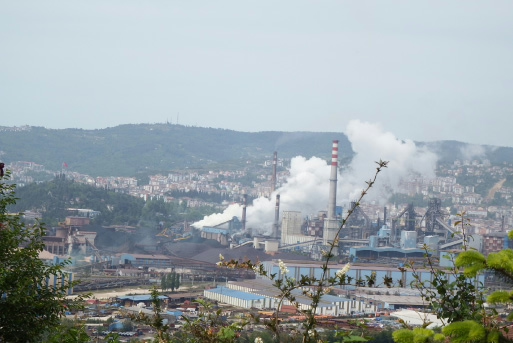
Worldwide, coal is primarily burned in power stations to produce electricity. The UK stopped burning coal to produce electricity in October 2024. The UK continues to use coal in the production of:
Some rural areas in the UK also rely on coal for household heating but this is reducing.
The use of coal makes these industries carbon-intensive, both in the mining and burning of coal (except in water filtration). Scunthorpe steelworks is the UK's second largest single-site source of CO2. This undermines the UK's emission reduction targets. It's vital that these industries decarbonise by finding coal-alternatives in their industrial processes.

(Türkçe olarak mevcuttur) Coal Action Network investigated the Turkish coal industry in 2024. This article looks at our findings and the links between Turkish coal, air pollution, Russia’s war and decarbonisation.

In Spring 2024, Coal Action Network investigators visited Turkey to see first-hand the impacts that imported coal was having on communities living near steelworks and power stations using coal. At that time, planning permission was in place for West Cumbria Mining Ltd to extract 2.78 million tonnes of coal a year, until 2049, from a coal mine under the sea near Whitehaven, Cumbria, UK.

Former steelworker, Pat Carr, spoke to Anne Harris from Coal Action Network about the financial support offered to workers when the Consett steelworks closed in 1980, and they discussed what can be done better, in workplaces like Scunthorpe steelworks. (Article published in Canary magazine)

Former steelworker, Pat Carr, speaks to Anne Harris from Coal Action Network about the financial support offered to workers when the Consett steelworks closed in 1980.

Port Talbot Steelworks in South Wales is the largest producer of virgin steel in the UK. Along with British Steel steelworks in Scunthorpe, Port Talbot steelworks is expected to shut down its blast furnaces in 2024 and build a 3 million tonne (MT) electric arc furnace (EAF) to recycle scrap steel. This is a measure to reduce the steelworks CO2 footprint by cutting out coal used in traditional blast furnaces in virgin steelmaking.

People hailing from Cumbria to London, and everywhere in between, descended on the Mines and Money Conference in London across two days (28th-29th Nov 2023). We demanded that investors stop pouring cash into the mining sector, and instead invest in our collective future. Together with Fossil Free London and other groups, we greeted investors with…

On 15th September 2023, The Guardian reported that Tata Steel accepted Government funding to avoid closing its steelworks in Port Talbot, South Wales, by decarbonising it instead – but at a loss of up to 3,000 jobs. The UK Government is providing £500 million, and Tata Steel is expected to provide another £725 million…

Update on coal extraction and use in the UK. The situation with coal production and use in the UK is changing. There is a legal challenges to the proposed West Cumbria coal mine and Aberpergwm extension; and an illegal mine operating in Merthyr Tydfil. Updated stats from the government’s July Digest of UK Energy Statistics.

Update on coal extraction and use in the UK. The situation with coal production and use in the UK is changing. There are no new opencast mines proposed; only one proposed opencast coal extension and one existing opencast extraction site…

New report from Coal Action Network. Coal in Steel provides background information to campaigns against proposed new coking coal mines and considering how coal needs to be phased out of steel production.